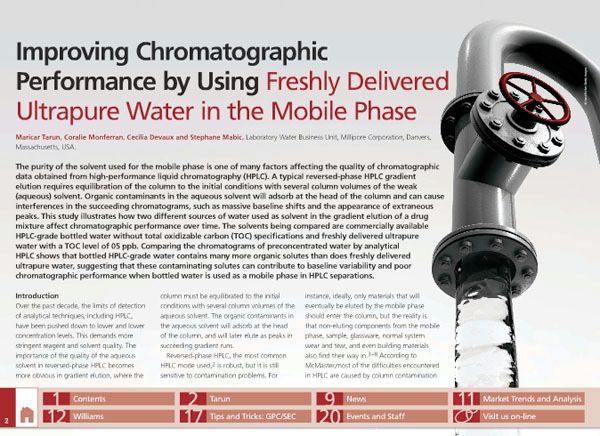Improving Chromatographic Performance by Using Freshly Delivered Ultrapure Water in the Mobile Phase
How to improve chromatographic performance using ultrapure water
The purity of the solvent used for the mobile phase is one of many factors affecting the quality of chromatographic data obtained from high-performance liquid chromatography (HPLC). A typical reversed-phase HPLC gradient elution requires equilibration of the column to the initial conditions with several column volumes of the weak (aqueous) solvent. Organic contaminants in the aqueous solvent will adsorb at the head of the column and can cause interferences in the succeeding chromatograms, such as massive baseline shifts and the appearance of extraneous peaks. This study illustrates how two different sources of water used as solvent in the gradient elution of a drug mixture affect chromatographic performance over time. The solvents being compared are commercially available HPLC-grade bottled water without total oxidizable carbon (TOC) specifications and freshly delivered ultrapure water with a TOC level of 05 ppb. Comparing the chromatograms of preconcentrated water by analytical HPLC shows that bottled HPLC-grade water contains many more organic solutes than does freshly delivered ultrapure water, suggesting that these contaminating solutes can contribute to baseline variability and poor chromatographic performance when bottled water is used as a mobile phase in HPLC separations.
Characterizing Polyamides Using Reversed-Phase Liquid Chromatography
May 5th 2025Polyamides can be difficult to characterize, despite their use in various aspects of everyday life. Vrije Universiteit Amsterdam researchers hoped to address this using a reversed-phase liquid chromatography (RPLC)-based approach.
New Method Explored for the Detection of CECs in Crops Irrigated with Contaminated Water
April 30th 2025This new study presents a validated QuEChERS–LC-MS/MS method for detecting eight persistent, mobile, and toxic substances in escarole, tomatoes, and tomato leaves irrigated with contaminated water.
University of Tasmania Researchers Explore Haloacetic Acid Determiniation in Water with capLC–MS
April 29th 2025Haloacetic acid detection has become important when analyzing drinking and swimming pool water. University of Tasmania researchers have begun applying capillary liquid chromatography as a means of detecting these substances.
Prioritizing Non-Target Screening in LC–HRMS Environmental Sample Analysis
April 28th 2025When analyzing samples using liquid chromatography–high-resolution mass spectrometry, there are various ways the processes can be improved. Researchers created new methods for prioritizing these strategies.

.png&w=3840&q=75)

.png&w=3840&q=75)



.png&w=3840&q=75)



.png&w=3840&q=75)







